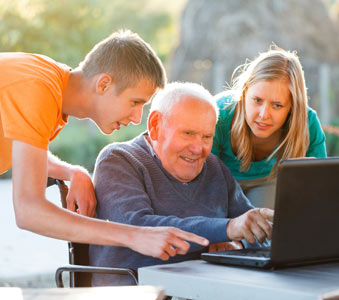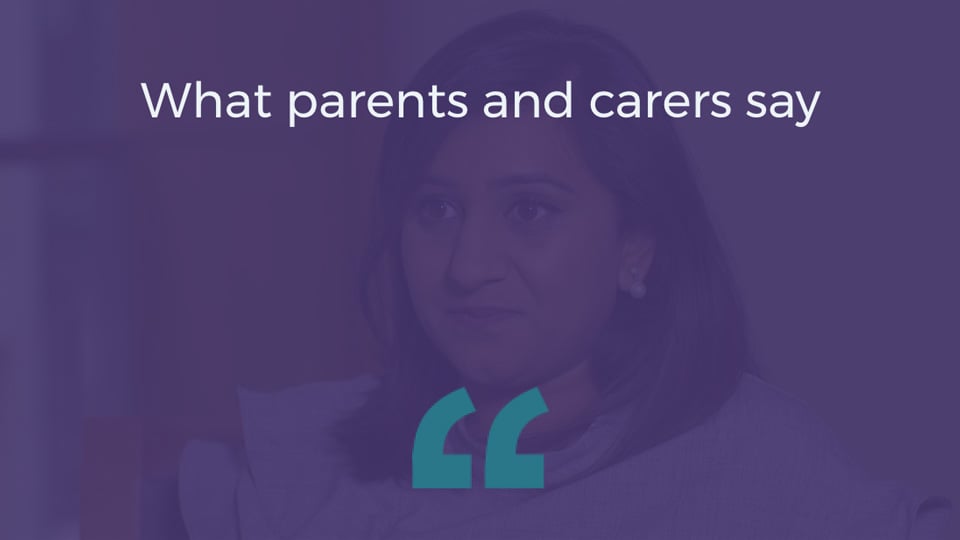Newsletter Sign Up
Regular work+family updates for
HR and diversity professionals.
My Family Care asks Andy: Caring for a family member, regardless of age, can bring with it it's fair share of guilt. Some people feel they are neglecting their partner, their children, and their friends when they become a carer for an elder relative. What can be done to alleviate these feelings and help the carer balance their work and family life?
A change of pace
I've recently moved out of London and now live in a wood, on the top of a hill. The central heating's not great - but otherwise, it's lovely! I enjoy the half-mile or so walk down the hill to our nearest town, I have a car, and my parents are a 20-minute drive away.
On the other hand, my next-door neighbour is 85, lives on his own and has long since hung up his driving gloves. He has no family close by, and it's a 250 mile round trip for his son to see him. Carers come twice a day, with visits generally perfunctory, and are his main form of social contact.
Realising needs
In the last six months it's noticeable how much he has changed. We've had a number of lucid conversations about his desire to be closer to his family, and he admits to the frustrations of being in the situation he's now in. "A strange part of my life" he calls it.
But whilst appreciating that he is unhappy with how things are, he also has more significant needs beyond help finding remote controls, taking out the bins and putting false teeth in the right way round. The knocks on my door are increasingly frequent, conversations more confused and questions more repetitive. Things don't look pretty, and of course this has a significant impact on all around him.
Not my problem?
I've been mistaken for his son but he's not family. And still I feel responsible. He could be one of my parents, or a friend, or me. It's close enough to home that the associated feelings of guilt and sympathy are significant. And if I feel like that, how must his son feel, with his own work and family commitments, two hours' drive away...
Why do I feel guilty?
The situation is sad and makes me feel guilty. Guilty because I feel a nagging sense of annoyance at sacrificing my time to help, but more importantly because I can't offer genuine long-term solutions, either to my neighbour or the other people involved.
So the guilt is kind of two-way:
- Because I can't help
- Because I could help more
A combination of guilt and selfishness, to which I've realised that there is no avoiding. There is no list of instructions to follow to make everything better. However, although I can't fix everything, there are a number of things I think can help...
Acknowledge that you are a carer
A few weeks ago I wouldn't have categorised myself as a carer. Thinking about it now, I guess I am. In whatever format that takes, it becomes part of your routine. It's not that tricky for me to imagine myself in a similar position with one of my own family members, and the last few weeks have made me more aware of that.
Caring is not something that you dip in and out of - it's a commitment.
Accept it's a thankless task
It's hard, but you need to accept that your help may well not be recognised, appreciated or remembered. Your approach to caring has to be led by emotion not obligation, as anything else is likely to lead to further guilt and even resentment.
So be honest with yourself. Recognise what you can do, and don't be frightened of saying what you can't.
Talk it through
Of course caring is not something you can completely plan for - there's always the chance that unforeseen assistance might be needed - but having clarity on the range of available options is useful. Involve your siblings, family and friends, even your employer. The more people you speak to, the more likely you are to find that other people have shared experiences and can be of value to helping with your own thought processes.
When we talk, people unknowingly offer practical and emotional support.
Lead your own life
I read recently that it costs a minimum of £150k to bring up a child to the age of 18. The article went on to talk about the sacrifices of time and energy, and there was a sort of tacit sense of responsibility to 'pay back' the people that brought you up.
Rubbish. Caring for a child and caring for an older family member are totally different. As much as you want to help, try not to feel that your life is inexorably linked to the person you are looking after. Easier said than done, but you will have further responsibilities - other family, friends, and work.
It's not about what you feel you should do, but what you can do, and only you will know what is and what isn't possible.
Remember distance adds to guilt
The ability to physically share space and time is not something we tend to think about, but, with an increasingly geographically dispersed family network, it is worth being aware of. If you can't help, simply because you can't physically be there, it can also add to the sense of guilt. Again, it's not easy to predict, but be aware of changes in situations.
On its own, not being able to walk a mile isn't a huge thing, but the implications it has can be far more significant - and certainly add to my neighbour's sense of isolation.
Wherever you are, check in with your family, ask questions and don't assume everything is ok.
Use technology
There's a lot of technology out there that can help, especially when it comes to distance caring. Solutions like Skype and video calling, although admittedly no replacement for being together, can nonetheless help bridge that gap. You can remotely access computers if someone needs help paying bills or writing letters. There are apps to remind people to take pills, or interact with carers.
But obviously these tools are dependent on a level of interaction, when waters are muddied by cognitive impairment it becomes a different challenge altogether.
Investigate what technology is available and decide what would help in your situation. Choose wisely and take into consideration how tech-savvy everyone involved is.
Pay it back
Like it or not, if you care for a family member you're not going to be able to completely avoid a sense of guilt. After all, no one's perfect.
But if there are factors that prevent you from fulfilling what you feel is your responsibility, then why not look closer to home. Is there someone else you could help? Do some shopping for? Have a chat? Take to see a friend? If so, then do it. Selfishly, it will make you feel better about yourself, but you'll also be genuinely helping someone else.
Little things can be a big help, and if everyone took a little more time to look after each other, I reckon we'd all find ourselves in a happier place.
Andy Major, Executive Manager, Good Care Guide












